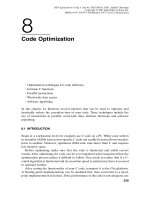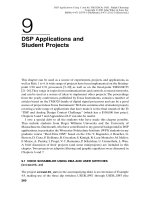Tài liệu McGraw.Hill.Stock Options And The New Rules Of Corporate Accountability doc
Bạn đang xem bản rút gọn của tài liệu. Xem và tải ngay bản đầy đủ của tài liệu tại đây (1.76 MB, 225 trang )
“Don Delves is one of the industry's most knowledgeable compen-
sation consultants. His book makes an important contribution to
the stock option dialogue.”—Larry Hirsch, Chairman & CEO of
Centex Corporation
“This is an excellent book for anyone interested in the important
discussion of stock option expensing and, more significantly, the
optimal use of stock options in compensation plans. It is written
from the point of view of an experienced and knowledgeable com-
pensation consultant who has advised board compensation com-
mittees and talked with many people outside the field considering
the economic and incentive effects of the overuse of stock options in
the 90s.”—John M. Biggs, former Chairman & CEO of TIAA-
CREF
“This book is very thoughtful and insightful. There are no right
answers– only degrees of balance. The author has achieved that
well.”—John Rau, President and CEO of Miami Corporation; for-
mer CEO of Chicago Title & Trust Company
“If you are on the Compensation or Finance Committee of a Board,
this is a must read. With the portfolio of executive compensation
Don Delves assisted us with, BorgWarner has risen to the top with-
out megagrants of stock options.”—John F. Fiedler, former Chair-
man and CEO of BorgWarner
“Don Delves has given us a clear, lively exposition of multiple
issues and variables to be considered in formulating incentives to
improve corporate and executive performance. Along with his
unequivocal advocacy of expensing stock options, he calls for a
more balanced approach to compensation, one that blends a variety
of elements to engender more attention on the long-term health of
the enterprise. His interviews with thought leaders such as Paul
Volcker and Myron Scholes and the incisive questions he poses help
frame a robust debate on the proper use of options.”—Ronald L.
Turner, Chairman, President, and CEO of Ceridian Corporation
00_200295_FM_Delves 8/20/03 11:07 AM Page i
This page intentionally left blank.
STOCK OPTIONS
AND THE NEW
RULES OF
CORPORATE
ACCOUNTABILITY
Measuring, Managing, and
Rewarding Executive
Performance
DONALD P. DELVES
McGraw-Hill
New York Chicago San Francisco Lisbon
London Madrid Mexico City Milan
New Delhi San Juan Seoul
Singapore Sydney Toronto
00_200295_FM_Delves 8/20/03 11:07 AM Page iii
Copyright © 2004 by The McGraw-Hill Companies, Inc. All rights reserved. Manufactured
in the United States of America. Except as permitted under the United States Copyright Act
of 1976, no part of this publication may be reproduced or distributed in any form or by any
means, or stored in a database or retrieval system, without the prior written permission of
the publisher.
0-07-143632-4
The material in this eBook also appears in the print version of this title: 0-07-141754-0.
All trademarks are trademarks of their respective owners. Rather than put a trademark
symbol after every occurrence of a trademarked name, we use names in an editorial fash-
ion only, and to the benefit of the trademark owner, with no intention of infringement of
the trademark. Where such designations appear in this book, they have been printed with
initial caps.
McGraw-Hill eBooks are available at special quantity discounts to use as premiums and
sales promotions, or for use in corporate training programs. For more information, please
contact George Hoare, Special Sales, at or (212) 904-
4069.
TERMS OF USE
This is a copyrighted work and The McGraw-Hill Companies, Inc. (“McGraw-Hill”) and
its licensors reserve all rights in and to the work. Use of this work is subject to these terms.
Except as permitted under the Copyright Act of 1976 and the right to store and retrieve
one copy of the work, you may not decompile, disassemble, reverse engineer, reproduce,
modify, create derivative works based upon, transmit, distribute, disseminate, sell, publish
or sublicense the work or any part of it without McGraw-Hill’s prior consent. You may
use the work for your own noncommercial and personal use; any other use of the work is
strictly prohibited. Your right to use the work may be terminated if you fail to comply with
these terms.
THE WORK IS PROVIDED “AS IS”. McGRAW-HILL AND ITS LICENSORS MAKE
NO GUARANTEES OR WARRANTIES AS TO THE ACCURACY, ADEQUACY OR
COMPLETENESS OF OR RESULTS TO BE OBTAINED FROM USING THE WORK,
INCLUDING ANY INFORMATION THAT CAN BE ACCESSED THROUGH THE
WORK VIA HYPERLINK OR OTHERWISE, AND EXPRESSLY DISCLAIM ANY
WARRANTY, EXPRESS OR IMPLIED, INCLUDING BUT NOT LIMITED TO
IMPLIED WARRANTIES OF MERCHANTABILITY OR FITNESS FOR A PARTICU-
LAR PURPOSE. McGraw-Hill and its licensors do not warrant or guarantee that the func-
tions contained in the work will meet your requirements or that its operation will be unin-
terrupted or error free. Neither McGraw-Hill nor its licensors shall be liable to you or
anyone else for any inaccuracy, error or omission, regardless of cause, in the work or for
any damages resulting therefrom. McGraw-Hill has no responsibility for the content of
any information accessed through the work. Under no circumstances shall McGraw-Hill
and/or its licensors be liable for any indirect, incidental, special, punitive, consequential
or similar damages that result from the use of or inability to use the work, even if any of
them has been advised of the possibility of such damages. This limitation of liability shall
apply to any claim or cause whatsoever whether such claim or cause arises in contract,
tort or otherwise.
DOI: 10.1036/0071436324
ebook_copyright 4x7.qxd 10/20/03 11:30 AM Page 1
Dedicated to
my mentors, Bob and Judith Wright,
and the Wright Institute for Lifelong Learning
00_200295_FM_Delves 8/20/03 11:07 AM Page v
This page intentionally left blank.
CONTENTS
FOREWORD: A Conversation with Paul Volcker xi
ACKNOWLEDGMENTS xvii
INTRODUCTION xix
PART ONE
THE STOCK OPTION PROBLEM 1
Chapter One
Dimensions of the Problem 3
The Problem with Options 6
The Current Situation 8
Executive Wealth and the Positive Power of Greed 9
Stock Options and Corporate Culture 10
Shareholder Activism 11
The Specter of Government Regulations 13
A Sea Change for Options and Executive Compensation 15
Board Responsibility 15
What Do You Think? 18
Chapter Two
The Sources of the Problem 19
Brief History of Compensation 19
Cultural Phenomena 21
Modern History of Compensation 27
Lessons of the LBO 29
When Executives Become Owners 33
The Role of Boards in Compensation 35
Stock Options for Start-Ups and the Technology Revolution 38
A Skewed Incentive System 40
vii
00_200295_FM_Delves 8/20/03 11:07 AM Page vii
For more information about this title, click here.
2004 by The
Copyright 2004 by The McGraw-Hill Companies, Inc. Click Here for Terms of Use.
Chapter Three
The Accounting Story 43
Behind the Scenes of the Accounting Debate 45
FASB’s Renewed Campaign 48
Measuring the Value of Options 51
Determining Fair Value 54
A New Chapter in the Story 58
PART TWO
ELEMENTS OF THE SOLUTION 63
Chapter Four
An Accounting Solution Everyone Can Live With 65
Accounting Rule Implications 67
Special Treatment for Start-Ups? 69
What Do You Think? 75
Bridging the Gulf 76
Chapter Five
Valuing Options 81
Black-Scholes and Beyond 83
The Four Guiding Principles 88
The Purposes of Stock 91
What Do You Think? 92
The Transition to Expensing Options 93
Chapter Six
Providing the Right Questions—and the Right Tools—
for Boards 101
Board Members’ Concerns 102
The Tyranny of Competitive Data 104
Taking a Deeper Look 110
What Do You Think? 114
viii CONTENTS
00_200295_FM_Delves 8/20/03 11:07 AM Page viii
Chapter Seven
Making Options Performance Based 117
Weighing Performance-Based Options 118
The Purpose of Options 119
Adding Performance Measures 120
Dealing with Underwater Options 122
Other Option Tricks 125
What Do You Think? 127
Bringing Balance to Executive Compensation 127
Chapter Eight
Designing a Balanced Portfolio of Incentives 131
The Risk Decision 131
The Psychology of Risk 132
From Bureaucrats to Innovative Thinkers 133
Taking a Healthy Risk 134
The Balanced Portfolio Approach 136
The Benefit of Stock Ownership 142
A Revolutionary Stock Concept 143
What Do You Think? 144
Building a Balanced Incentive Program 145
Chapter Nine
Building Healthy Employee-Employer Contracts for Public
and Private Companies 149
An Unhealthy Contract 151
Lessons of the New Economy 154
Making Healthier Contracts 155
The Role of Compensation 156
The Role of Long-Term Incentives 161
The Private Company 162
What Do You Think? 164
Valuing People and the Purpose of the Corporation 164
CONTENTS ix
00_200295_FM_Delves 8/20/03 11:07 AM Page ix
PART THREE
THE PATH TO ACCOUNTABILITY 169
Chapter Ten
Restoring Corporate Integrity 171
Restoring Corporate Integrity: 9 Steps to a Healthier Organization 173
What Do You Think? 180
The Role of the CEO 180
Chapter Eleven
Vision for the Future 185
The Power of the Corporate Executive 186
A Vision for the Future 187
Endnotes 193
Index 195
x CONTENTS
00_200295_FM_Delves 8/20/03 11:07 AM Page x
FOREWORD: A CONVERSATION
BETWEEN DON DELVES AND PAUL
VOLCKER, FORMER FEDERAL
RESERVE CHAIRMAN
When I set out to write this book, my topic was stock options.
Specifically, my intent was to explore the much debated issue of
expensing stock options. While that remains an essential theme of
this book, it is impossible to address stock options without looking
at the broader picture. Put another way, stock options are the trees;
executive compensation and effective corporate governance are the
forest.
After completing this project, I am left with several compelling
questions. What can we do differently? How can executive com-
pensation become more balanced and healthier? What changes in
corporate governance are necessary to ensure that independent-
minded boards are better equipped to design and implement exec-
utive compensation packages that are based on performance? How
can ownership in a corporation be used as a reward after perfor-
mance is demonstrated instead of as a perk that comes with the job?
This then leads to the ultimate question: what is the purpose of
the corporation and how is its success measured? Is the end goal of
the corporation to serve its shareholders? If so, then the stock price
would be the ultimate benchmark of its success. Or is the purpose of
the corporation something more, with shareholders, executives,
board members, and employees as integral parts of a greater mission?
These are the questions I had in mind when I spoke with Paul
Volcker, former Federal Reserve Chairman (1979 to 1987) and cur-
rent chairman of the International Accounting Standards Com-
mittee (IASC) Foundation, which oversees the International
Accounting Standards Board (IASB). Mr. Volcker is also among the
12 members of The Conference Board’s Commission on Public Trust
and Private Enterprise, which has undertaken an in-depth study of
compensation, auditing, and governance issues. He is an outspoken
advocate for better corporate governance and more sensible execu-
tive compensation.
In our discussion I was pleased to find that Mr. Volcker and I
shared many views, particularly the need for a better system of
executive compensation and more rational use of stock options. An
excerpt from our conversation follows:
xi
00_200295_FM_Delves 8/20/03 11:07 AM Page xi
Copyright 2004 by The McGraw-Hill Companies, Inc. Click Here for Terms of Use.
Paul Volcker: What I find fascinating is that, even though the market
is down, executive compensation has not come down significantly.
Stock options, in particular, have continued to be as high, or higher,
as in the past.
Don Delves: In recent years, you have been very vocal about your
opposition to excessive use of stock options.
Volcker: What I am opposed to are fixed-price stock options for large,
broadly held companies. When you talk about stock options, it’s eas-
ier to think about it the other way around. A private company that’s
a start-up can do what it wants. It can choose to give away stock in
the form of options, largely because it doesn’t really have any cash. I
would say the same thing applies pretty much for a technological,
publicly held company with a large concentrated ownership.
However, when you get to most big, publicly held companies,
the stockholder is not in charge. He’s at the mercy of what the board
says and the board does. The stockholder is pretty far removed in
terms of direct decisions. And, except in the most egregious cases,
you can get very big stock option grants in a very big company. And
it still doesn’t have that much dilution for the typical stockholder—
not enough that he’s going to be charging the barricades over it!
Delves: There are clearly times when stock options make sense and
when they do not. For example, with a new company, options are a
way to offer stock without really giving ownership, and they are a
way to pay people without use of scarce cash. But there is absolutely
no way that stock options are the best incentive for every single cor-
poration in America and for every single executive in vast quantities.
Volcker: We never would have had these excesses in executive com-
pensation in my view, except for the growing popularity of stock
options. People did not think they were giving away all that much.
But when you have the greatest boom in the stock market in all of
history, what they thought was very large and generous became
grotesque.
Delves: It’s gotten to absurd proportions. Another interesting factor is
when I assess the value of an option using the Black-Scholes (option
valuation) formula. It used to be an option was worth 0.35 times the
exercise price. Today it’s 0.5 times the exercise price. The reason is
because the volatility of the market has gone up. The primary thing
that has made an option worth more is the fact that volatility is
higher. At the same time that occurred, option grants have gone up
400 to 600 percent. It was a remarkable explosion.
xii FOREWORD
00_200295_FM_Delves 8/20/03 11:07 AM Page xii
Volcker: Some people have made the calculation that 80 to 90 percent
of the payoff from stock options must be capricious. The problem,
however, was that in the midst of a stock market boom, everybody
was getting paid off—even if you weren’t doing that well. And then
it reached truly grotesque proportions when people were getting
paid off when the company was going bankrupt! Looking at it in
hindsight, and it is partly because of the bull market, you can see just
how capricious stock options really were as a reward mechanism.
There isn’t much relationship between the reward and the effort, the
ability, or the contribution.
Delves: You have done a lot of work on board governance, particu-
larly as it relates to executive compensation. How do you get boards
to govern better?
Volcker: My favorite corporate governance reform is to have inde-
pendent directors who make independent judgments and who have
responsibility for oversight. That’s a starting point. That’s the kind of
board you ought to have. But it’s not going to be effective unless you
get some kind of leader of the board who is able to coalesce that dis-
cussion. This says to me that the preferred way in an organization is
a nonexecutive chairman. Find independent directors, not to be
antagonistic, but to have the opportunity to discuss things among
themselves, to put things on the agenda, and to demand things be
put on the agenda. When something goes wrong and there is a real
question about the CEO, then you have some ability to discuss it and
take action.
FOREWORD xiii
FIGURE I-1
The Good, the Bad, and the Ugly of Stock Options
Good: Options for start-ups and other cash-strapped companies; options
that vest based on performance; options with exercise prices
that vary with the market.
OK: Fixed-price options as part of a mix of performance-based
incentives and/or required stock ownership.
Bad: Fixed-price options for large, established public companies.
Ugly: Mega grants of fixed-price options to executives of large,
established public companies.
Very Ugly: Mega grants of options to executives of poorly performing
companies whose stock price has dropped precipitously.
00_200295_FM_Delves 8/20/03 11:07 AM Page xiii
Delves: The other part of executive compensation is the subject of
ownership. Why do we feel compelled to give people ownership?
Why don’t we expect them to earn it? Shouldn’t we be structuring
compensation systems that say, okay, we’re going to give you an
interest in the company, but you have to earn it over time? You have
to consistently demonstrate and create value in order for this to come
to fruition. So if it’s an option, it vests based on some kind of long-
term, demonstrable performance. It’s an option that allows an exec-
utive to buy stock at today’s price—or even below today’s price—but
over the next 5, 7, or 10 years. But someone has to consistently create
value that is greater than what they are receiving their salary for.
Volcker: In my own thinking I believe this whole idea of equity com-
pensation is overdone. Take this whole idea of paying directors in
stock. Should directors who were overseeing the behavior of the
company be motivated themselves for the short-term performance of
the stock?
Delves: That goes back to the larger point that we focus way too much
on stock and stock prices. Some studies show that 75 percent of the
movement of the stock has very little to do with what the executives
actually do.
Volcker: This is not just a function of stock options, but stock options
do exaggerate it. I’ve told the story many times, but I remember sit-
ting here with a Wall Street business leader. He said, “What can you
expect when for 20 years the best business schools have been teach-
ing that all that matters is stock price.” I thought about that and came
to the conclusion that he was right.
Delves: We were taught to believe that total return to shareholders is
the be-all, end-all, and ultimate measure of a company’s health and
success.
Volcker: But you’ve got these big public companies, and they
aren’t issuing any stock. The stock price is irrelevant to their basic
financing. Right through this past decade—the greatest bull market
in history—what did these companies do? They bought stock. They
didn’t sell stock. Some individual companies did. But companies
as a whole were buying back stock and not issuing stock.
I remember addressing an audience, it was probably during the
late 1970s when I was Federal Reserve Chairman, and there was a
CEO in the audience. He said, “When it comes right down to it, I
don’t know why we care that much about stock price. I don’t sell
xiv FOREWORD
00_200295_FM_Delves 8/20/03 11:07 AM Page xiv
stock. I don’t go to the market for new capital ever. There are a lot
more important things to the company than the day-to-day move-
ment of the stock price.”
Delves: If we are not looking at the stock market strictly as a source of
equity capital, then that turns everything upside down. We assume
the purpose of the company is to serve the shareholders. Yes, they are
important as a source of capital. But that capital is used in pursuit of
the company’s actual purpose: to produce goods and services and
sell them in the market.
Volcker: That’s right. The purpose of the company is really to provide
goods and services at the best possible price, at the highest level of
productivity, and in a way that serves society and communities. That
is the purpose of the company. The stock is just the way that we get
there.
FOREWORD xv
00_200295_FM_Delves 8/20/03 11:07 AM Page xv
This page intentionally left blank.
xvii
ACKNOWLEDGMENTS
To my wife, Denise, for her consistent belief in me, and whose con-
stant, loving, and sustaining support creates the environment in
which I live and work. To my daughter, Lucy, who cheers me on,
and is consistently proud of her dad for running a business, writing
a book, and doing positive things in the world.
To my father, Gene Delves, on whose shoulders I stand. For his
35 years as an Arthur Andersen partner, which provided me with
an example of life as a consultant and what it means to work for a
meritocracy, and for his many, invaluable business contacts. To my
mother, Sue Delves, whose energetic demeanor and tireless com-
mitment to public service and public speaking have been a great
example and inspiration.
To Bob Wright, my mentor and coach, for his inspiring, com-
pelling vision of what’s possible, and for leading me to believe
I can make a positive difference in the world. To Judith Wright,
my spiritual leader and guide, whose dedication to service and her
belief that we are all loved deeply and unconditionally have been
an inspiration and helped me to expand my vision beyond what I
ever thought possible.
To my fellow leaders at the Wright Institute, who coach me,
encourage me, give me helpful criticism, and expect the most from
me, including Rich and Gertrude Lyons, Mike Zwell, Tom Terry,
Angie Calkins, Kathy Schroeder, Barb Burgess, Collin Canright,
John Trakselis, Brian Laperriere, Art Silver, Jeff Stitely, Corey
Coscioni, Stan Smith, Rob Johnson, James Gustin, Jeff Golden,
Kevin McCann, Paul Minnihan, and Marty Goldman.
To John Balkcom, with whom I worked at Sibson and Com-
pany, and who encouraged me to pursue stock option reform as a
“life’s work.” To Rich Semmler, who taught me to be a damn good
compensation consultant. To Warren Batts, former CEO of Premark,
who has coached and encouraged me to speak the truth and under-
stand the perspective of a highly conscientious and concerned
board member.
A special thanks to Charles “Chuck” Bowsher, former Con-
troller General of the United States and a member of The Conference
Board Commission on Public Trust and Private Enterprise, who
appreciated the importance of my message and opened several
valuable doors for me.
00_200295_FM_Delves 8/20/03 11:07 AM Page xvii
Copyright 2004 by The McGraw-Hill Companies, Inc. Click Here for Terms of Use.
To the thought leaders who took the time to speak with me
and to share their thoughts on compensation in general and
stock options in particular. They include John Biggs, immediate
past chairman and CEO of the Teachers Insurance and Annuity
Association-College Retirement Equities Fund (TIAA-CREF); Graef
“Bud” Crystal, former compensation consultant, author, and colum-
nist on executive compensation for Bloomberg.com; John Fiedler,
former Chairman and CEO of BorgWarner; Larry Hirsch, Chairman
and CEO of Centex Corp.; Gary Hirshberg, Chairman and CEO of
Stonyfield Farm; Jim Leisenring, board member of the International
Accounting Standards Board (IASB); Jon Najarian, options trader
and principal of Mercury Trading and PTI Securities; Ronald Turner,
Chairman, President and CEO of Ceridian Corp.; Nobel Laureate
and economist Myron Scholes, coauthor of the Black-Scholes
methodology for valuing options, and Paul Volcker, former Federal
Reserve Chairman, member of the Conference Board Commission,
and chairman of the International Accounting Standards Commis-
sion Foundation.
To Scott Balutowicz, my associate at the Delves Group, for his
valuable research and consistent cheerleading; and to Tricia Jacobs,
who assisted with the graphics.
To Ela Booty, who introduced me to my publisher.
To my editor, Kelli Christiansen, for championing this project,
for her enthusiasm, and for her valuable editorial guidance.
And to my writer, Tricia Crisafulli, whose brilliance, speed,
passion, partnership, and true caring for the message helped shape
this book.
(For more information about The Delves Group, please see our Web site at
www.delvesgroup.com. To contact the author, send an email to optionsbook@
delvesgroup.com.)
xviii ACKNOWLEDGMENTS
00_200295_FM_Delves 8/20/03 11:07 AM Page xviii
xix
INTRODUCTION: STOCK OPTIONS
AND EXECUTIVE COMPENSATION
There are only two reasons to write a book: the first is because you
have a particular knowledge or expertise, and the second is because
you feel passionately about something. Such are my reasons to write
this book.
I have been a consultant in the field of executive compensation
for 20 years. I have seen the use of stock options rise as an ever-
increasing part of executive compensation. Now we’re faced with a
watershed event. Nearly a decade after a failed attempt to change
the accounting rules, it appears as though Corporate America will
be faced with the necessity to expense options. As this book goes to
press, the Financial Accounting Standards Board (FASB) and its
London-based counterpart, the International Accounting Standards
Board (IASB), are drafting and finalizing proposed rules that will
require stock options to be expensed.
There has been heated debate over the accounting issue. Com-
panies and consultants have been on both sides of the issue. To
weigh in on the debate, I’ll state for the record that I am an avid pro-
ponent of stock option expensing. Options have a real cost to the
company, and they represent something of real value to the recipi-
ent. Stock options are a compensation event; they are part of peo-
ple’s pay. Thus stock options are an expense for the company; that’s
a given. But how that expense is determined and what its implica-
tions are for all companies need open and thoughtful debate.
As a Chicago-based compensation consultant and principal of
The Delves Group, I’ve done my share of advising companies on
using stock options. I’ve recommended that companies follow the
“standard practice,” which for many years meant doling out huge
amounts of stock options. I’ve explained how an accounting
expense could be avoided under the current accounting rules
(which I’ll refer to in this book as the “old” accounting rules). It’s
part of my job to advise companies on the rules and how they work.
I know the intricacies of the loophole and how to avoid running
afoul of it.
My stance in favor of option expensing may look like I’m bit-
ing the proverbial hand that feeds me. Obviously executives and
senior managers have benefited, and in some cases benefited richly
from vast quantities of options granted under the “old” rules. The
00_200295_FM_Delves 8/20/03 11:07 AM Page xix
Copyright 2004 by The McGraw-Hill Companies, Inc. Click Here for Terms of Use.
stock price only had to rise modestly in order for these options to
pay off handsomely. Executives granted options, for example, with
a $10 exercise price when the stock was trading at $10 a share, had
to do very little in order to turn a profit. If they kept their feet under
their desks and made sure nothing went horribly wrong, they made
out handsomely as the stock price rose. Stock price appreciation,
over the long term on average, runs 10 to 15 percent per year. Is it
good governance or management to provide huge rewards just
because things are rolling along? I do not think so.
The truth is all of us who are involved in compensation—
whether consultants designing pay packages, board members
approving compensation, or executives on the receiving end—are
facing a kind of reckoning. We have to move beyond the academic
point of option expensing and look at the bigger picture looming in
the background. This picture has been clouded with lucrative stock
options granted without a clear set of performance criteria, since
current or “old” accounting rules made that difficult and unwieldy.
Few of us ever stopped to think about the “why” of the compensa-
tion packages that increased several hundred percent in the last
eight to ten years.
The accounting issue is really an invitation for companies,
boards of directors, and the compensation consultants who advise
them to become more accountable. Measurement is the key to
accountability. As the saying goes what gets measured gets man-
aged. When we account for things, we are held accountable for our
actions. Checks and balances are introduced into the system. Com-
pensation is payment for something. Executives are rewarded—and
should be rewarded well—for excellence, innovation, and healthy
risk-taking to move the company forward. Whatever that compen-
sation looks like—whatever combination of cash compensation,
stock, and stock options are offered—there must be commensurate
accounting for how that money is earned.
The accounting rule change, therefore, will only be the means
to a much better end. The world of executive compensation will be
far healthier. CEOs and other top executives will still—and
should—make a great deal of money. But the earning of that com-
pensation in accordance with performance standards, goals, and
other criteria will be clearer. There will be a more direct link
between pay and performance and thus more accountability.
xx INTRODUCTION
00_200295_FM_Delves 8/20/03 11:07 AM Page xx
Will stock options disappear? I hardly think so. Nor should
they. There is nothing inherently wrong or bad with stock options.
The damage is done, however, when huge amounts of stock
options—which promise a share of future shareholder wealth—are
granted indiscriminately. In the new world of executive compensa-
tion, stock options and all other forms of compensation will have to
be earned through performance.
Given the decline in the stock market over the past three years,
stock options may not be perceived as the bonanza that they once
were. There are many companies who have granted stock options
in the past, with exercise prices that are far above where the stock is
currently traded. Paper fortunes have been amassed and lost. In this
environment could the bloom be off the stock-option rose? Perhaps.
Companies must use lucrative rewards to attract and retain tal-
ent. Human capital, from the executive office to the sales depart-
ment to the factory floor, has become increasingly important. But
merely granting options “freely” is not going to be the one-size-fits-
all solution. For one thing under the proposed (“new”) accounting
rules, the options will not be free. More importantly companies will
need to question if a stock option is the right kind of incentive—
with the desired perceived value—to provide to executives and
other employees.
Microsoft recently took a bold and revolutionary step in decid-
ing to replace all of its stock options for virtually all of its employ-
ees with restricted stock. In so doing, this leader of the technology
industry has acknowledged the limited perceived value of options
relative to their likely expense and the need to replace them with
more highly valued and effective incentives. While the new
restricted shares for most employees will vest over five years based
only on time with the company, shares granted to the top 600 exec-
utives will be based on achieving performance objectives. To truly
improve executive compensation, it is critically important that com-
panies do not just blindly replace executive options with time-
vesting restricted stock. This will merely replace a gamble with a
gift. Future long-term incentives must be based on achieving
specific performance goals.
Many others in the broad world of compensation are seeking
to do things differently. I have talked with people who have a
variety of well-reasoned opinions and points of view. At the end of
INTRODUCTION xxi
00_200295_FM_Delves 8/20/03 11:07 AM Page xxi
xxii INTRODUCTION
many chapters you will find questions to consider about stock
options and executive compensation, as well as interviews
with respected CEOs and other thought leaders. It is my hope
through this book to foster a robust debate. The goal is to develop
solutions that promote healthier companies and by extension
a stronger economy.
00_200295_FM_Delves 8/20/03 11:07 AM Page xxii
PART ONE
The Stock Option Problem
01_200295_CH01_Delves 8/25/03 8:56 AM Page 1
Copyright 2004 by The McGraw-Hill Companies, Inc. Click Here for Terms of Use.
This page intentionally left blank.









